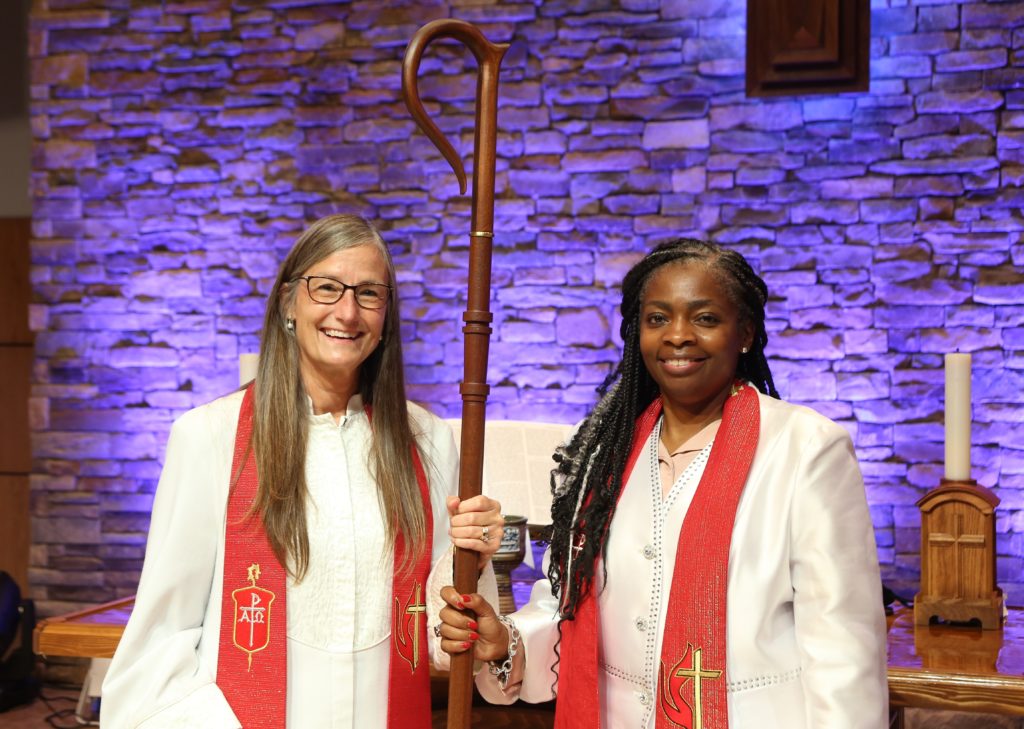“He handed out gifts of apostle, prophet, evangelist, and pastor-teacher to train Christians in skilled servant work, working within Christ’s body, the church, until we’re all moving rhythmically and easily with each other, efficient and graceful in response to God’s Son, fully mature adults, fully developed within and without, fully alive like Christ.” — Ephesians 4:11-13 (The Message)
In her book, “The Equipping Church,” Sue Mallory sums up those words from Paul like this: “When the church is healthy, she dances.”
West Virginia United Methodist Conference Bishop Sandra Steiner Ball said that spiritual gifts are designed to be used on behalf of others, and when they are, it “creates movement and improves the community.”
Spiritual gift dance partners, so to speak, within church communities throughout the WVUMC are moving together to the music of ministry. Take, for instance, Cheryl Davis, who helps her church, Elizabeth Memorial UMC in Charleston, dance by partnering her spiritual gift of administration with those gifted in more creative, less organized ways.
“I think there’s a reason we all have different gifts,” Davis said. “Some people are very conceptual and creative. Then, on the other hand, there has to be someone who makes those things happen, who brings those creative, conceptual ideas to fruition. … It’s a partnership.”
Mallory’s book explains what a church looks like when its members become “vital, fully empowered partners in ministry.” It is one of several books aimed at helping churches reach their full potential by placing the right people in the right roles.
Christine Harman is the author of another one, “For the Common Good: Discovering and Using Your Spiritual Gifts.”
“We are more effective and efficient in our ministry when we use our spiritual gifts,” Harman writes.

Bishops Steiner Ball and Cynthia Moore Koikoi agree. They advise that everyone take a spiritual gifts inventory to not only provide direction, but to validate an existing passion — not for personal gain, but for the edification and building up of the body of Christ.
“The benefit of it is that you have energy to do the thing to which you have been called, because if you’re operating outside of your gift set, that’s when ministry gets depleting. That’s when it’s easy to get discouraged,” Bishop Cynthia said.
Carol Cartmill and Yvonne Gentile deliver a similar message in their book, “Serving from the Heart: Finding Your Gifts and Talents for Service.” In a foreword by Adam Hamilton, senior pastor of The United Methodist Church of the Resurrection, Hamilton writes, “ … when we understand which spiritual gifts may be needed for a particular kind of task in the church, help persons identify their spiritual gifts, and then align the right people for the right tasks, the work of the ministry is more effective and the experience of those doing the ministry is full of joy — for they have found the very thing they were gifted to do.”
The bishops and these authors believe that serving from giftedness makes all the difference when it comes to being an effective church, group or committee. Their gift-based ministry approaches point out that each spiritual gift has a distinct role to play in building up the local congregation.
“Studying spiritual gifts, learning to work with them, and letting them work for the church can open up and expand fruitful ministry,” Harman writes. “ … Persons serving from their gifts can experience greater joy in serving, and that joy spills over into the life of the congregation.”
She points to 1 Corinthians 12, in which Paul compares the role of spiritual gifts and the body of Christ, emphasizing the importance of each body part performing the function for which it was designed, yet working together as one.
“And so it is with the body of Christ,” Harman writes. “As good as it may be for us as individuals to understand our own gifts, it would be like only one part of the body knowing what it is supposed to do.”
Bishop Moore-Koikoi said that when individual parts of the body have the energy and passion that come with spiritual gift awareness, it benefits the whole body, “because then you’re operating not out of resentment — ‘this is something I have to do’ — but operating out of ‘this is something I get to do.’ ”
Harman points out the problems — things like minimal output, conflict and burnout — that can arise when someone serves out of a sense of obligation instead of out of giftedness. To avoid such problems, she suggests nominations committees use spiritual gifts as a means of identifying potential leaders, then help those leaders by providing written ministry descriptions, naming what spiritual gifts may be helpful for the various ministries. She also recommends giving those people who said ‘yes’ out of a sense of obligation an opportunity to make a change.
“Spiritual gifts are very different from skill sets,” Bishop Sandra said, explaining that just because someone is good at math, for instance, it does not necessarily mean that person has the spiritual gifts that would suit her to serve on a finance committee or as a treasurer. That person may find more joy, and in turn help the whole church, by serving in a way more closely aligned with her spiritual gifts.
As Cartmill and Gentile put it, church leaders should give members of the body an opportunity to “serve with less frustration and more joy.”
“God’s plan for the church calls for each of us to serve in a way that allows us to be effective and to feel personally fulfilled,” they write. “God purposely created each of us to be unique — with different spiritual gifts, talents, resources, individuality, dreams, and experiences — so that together, as the unified body of Christ, we could accomplish God’s work in this world.”